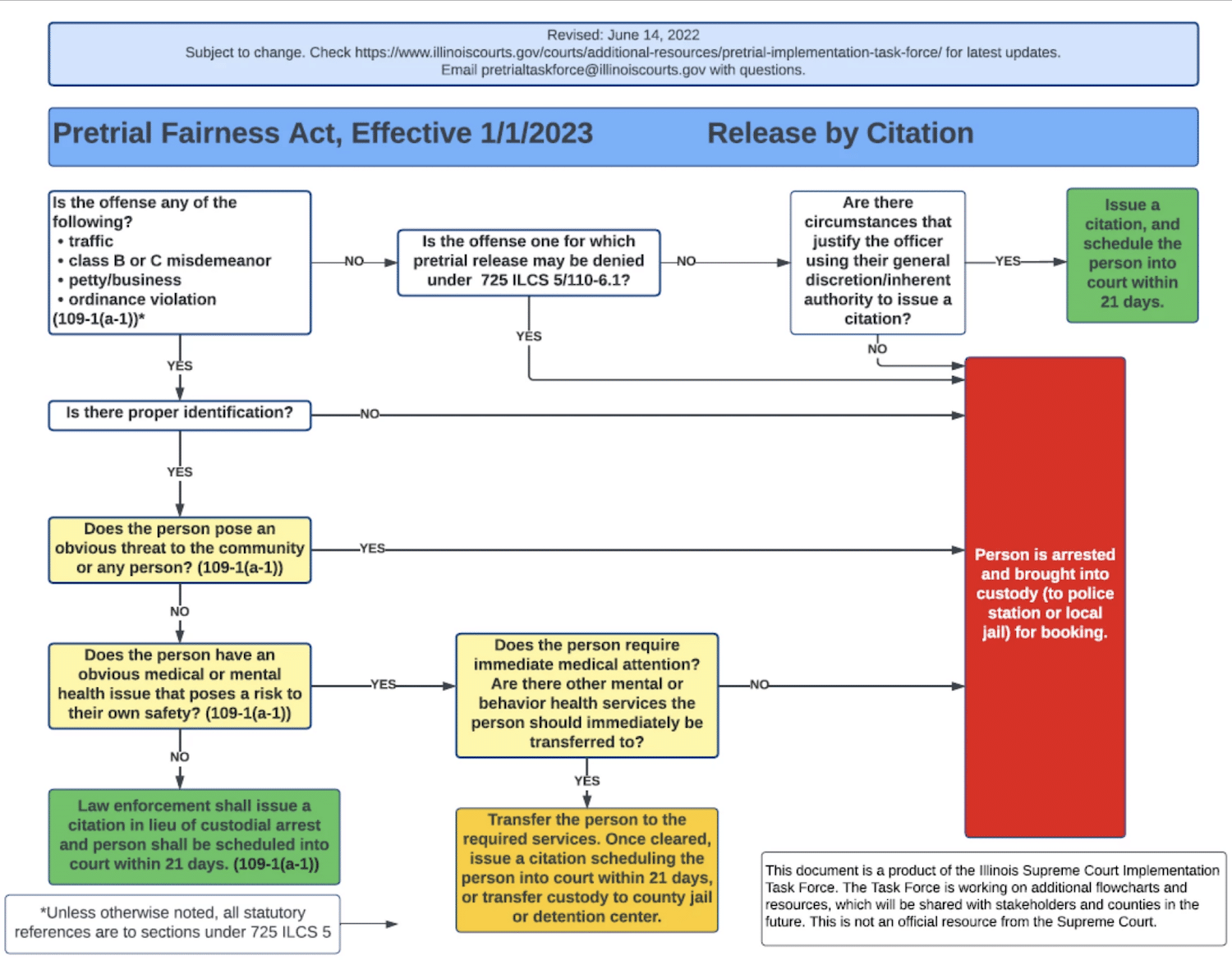No cash bail causes concern

The Pretrial Fairness Act passed early last year as part of the larger SAFE-T Act criminal justice reform bill will eliminate the cash bail system for anyone cited for alleged criminal behavior in Illinois beginning Jan. 1.
The intent of the act is to reduce the number of people incarcerated prior to a guilty verdict by limiting the circumstances in which a judge can order pretrial detention.
Another goal is to prevent extended jail time for minor offenses while keeping those accused of more serious crimes in jail.
“We do not want someone in jail because they were arrested for a low-level crime like shoplifting to be sitting in jail for months,” Illinois Gov. JB Pritzker said. “At the same time, someone who is a wealthy drug dealer, perhaps accused of murder and arrested, can show up with a suitcase full of money and get out of jail.”
The bill has become a hot topic among members of the state’s law enforcement community, judicial system, lawmakers and politicians.
Pritzker’s gubernatorial opponent, Sen. Darren Bailey (R-Xenia), has called for a full repeal of the law, vowing to restore the cash bail system if elected.
State’s attorneys in four counties have filed separate lawsuits against Pritzker and Illinois Attorney General Kwame Raoul regarding the new law.
The suits claim the law is “unconstitutional” in the way it was passed and in regard to its vagueness.
At least one suit cites a “separation of powers violation” inasmuch as “the legislation is an unlawful intrusion into the central powers of the courts.”
While the current version of the law states, in part, “Law enforcement shall issue a citation in lieu of custodial arrest, upon proper identification, for those … who pose no obvious threat to the community or any person,” circuit judges are now required to play a vital role in determining who will be granted pretrial release for more serious offenses.
A number of unfounded claims have surfaced which take a reading of the law out of context.
One popular social media post claims offenses such as aggravated battery, kidnapping and second-degree murder, among others, will be “non-detainable offenses” when the law takes effect.
In such instances, judges have the option to detain suspects prior to a trial date if the person “poses a real and present threat to the physical safety of any person” or if “the person has a high likelihood of willful flight to avoid prosecution.”
However, the lack of clarity in the law has led to so much apprehension about the impact of ending cash bail that the Illinois Supreme Court has created a Pretrial Implementation Task Force.
“It is frustrating because many aspects of the statute are not clear,” retired Judge Robbin Stuckert, who chairs the task force, said at a July town hall meeting, admitting there “may be vague, gray areas.”
Last Wednesday, Pritzker also admitted the law needs revision.
“Are there changes or adjustments that need to be made? Of course,” he said.
The law’s sponsors in the General Assembly said they are working with the task force on legislation clarifying some of those matters – particularly when it comes to detainable offenses – for potential passage this fall.
Another problem will be getting suspected criminals to show up for court, Monroe County Sheriff Neal Rohlfing anticipates.
Rohlfing explained that if a person under pretrial release misses a court date, a summons – not a warrant – will be issued for a second trial date.
Rohlfing noted that municipalities are not authorized to issue summons, which will create an additional burden on county sheriff’s departments once this bill takes effect.
Yet another question remains about what will happen with current inmates starting Jan. 1.
Madison County State’s Attorney Thomas Haine last Wednesday issued this statement:
“The greatest jailbreak in Madison County history will occur on Jan. 1, 2023. On that date, approximately half of our present jail population must be released under the terms of the new SAFE-T Act.”
Monroe County State’s Attorney Lucas Liefer said his office will review cases ahead of the new year to establish pretrial conditions for those accused of offenses which qualify for release under the new law.
“I don’t see how we can hold someone (currently in custody)” who would not otherwise be detained, Liefer said.
The reality of empty jails was discussed during last week’s budget hearings with the Monroe County Board.
Rohlfing proposed an “option” of doubling the amount of potential federal inmates at the jail from 12 to 24 if the number of inmates is reduced dramatically next year.
He noted it would be difficult to justify a jail budget to house less than one quarter of the facility’s 48-person capacity, adding the annual revenue for housing 24 federal inmates would be around $500,000.
Rohlfing said federal inmates are “not usually violent offenders” and are usually those convicted of drug-related, firearms, or “white collar” crimes.
The sheriff said he does not want to eliminate the county jail as a resource because he anticipates the “system is going to implode” when cash bail is eliminated.
Rohlfing said the new law is “creating a very bad situation,” especially in highly populated metropolitan areas.
“St. Clair County is going to burn,” Rohlfing said, explaining he anticipates a dramatic increase in burglaries, thefts and property damage because “no one is going to jail” when the law goes into effect.
“It’s what happens when you don’t hold people accountable. I don’t know why we continue down this path,” he continued. “Nothing is done for the victims. Where are their rights?”
Regardless of the impact of the new legislation, Rohlfing said his department “will do everything we can to provide a high level of public safety.”
He addressed one concern regarding the supposed inability under the new law for police to remove trespassers from private property – a claim made recently by Overland Park Mayor and congressional candidate Keith Pekau.
Rohlfing said he believes, especially with instances of hunters trespassing on private property, his department would be able to “validate a threat,” thereby allowing deputies to detain a suspect in such cases.
Rohlfing and Liefer – who has also expressed “disappointment” with the new law – will be speaking at an October meeting of the Columbia Rotary Club to discuss concerns and answer questions about what happens starting Jan. 1.
Rohlfing said they are also exploring the possibility of holding an event with a similar theme at a larger venue for all interested county residents.






